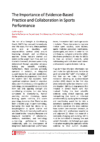Abstract
The role of a Strength & Conditioning Coach (S&CC) has evolved tremendously over the years. Formerly, these positions were seen as novelties, with responsibilities centered solely around improving strength and conditioning qualities. Currently, job responsibilities can stretch from not only applying strength and conditioning principles, but also being competent in biomechanics, human anatomy, exercise physiology, motor learning, sports nutrition, and sports psychology, to name a few. It’s vital for S&CCs to lean on relevant research, while collaborating with both direct and indirect professionals to guide decision making. Adopting an evidence-based practice (EBP) should be the first step when determining the best intervention in any situation. Applying this to strength and conditioning would be to take a systematic approach to training athletes and clients based on the best evidence from current peer-reviewed research, in conjunction with professional experience and judgment. Ultimately, EBP can provide S&CCs with strength of certainty regarding their decisions. In addition to the research, individual experience and observation, in conjunction with the preferences and constraints of the environment, are just as important. Both scientific research and practical experience are necessary and complementary components of furthering EBP. Developing the best EBP will require a combined approach, in which coaches and researchers work in collaboration to provide the greatest degree of insight into the effects of any intervention. Cultivating sustainable, integrated, and open-minded work relationships can heavily influence how we’re assimilating important information. Sharing information and an adopting an open-minded approach can lead to skills, techniques, and research being shared far more easily. Ultimately, integrating an EBP and fostering quality professional relationships at work sets the foundation to optimize decision-making and minimize interference within the development of our athletes.



Responses